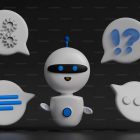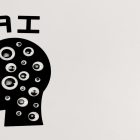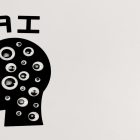Artificial Intelligence Chatbot: Revolutionizing Customer Service

Artificial Intelligence Chatbot – As technology continues to advance, so does the way we interact with machines. One of the most innovative and impactful technologies is artificial intelligence (AI) chatbots. In this article, we will discuss what AI chatbots are, how they work, and their benefits in revolutionizing customer service.
1. Introduction
Artificial intelligence is transforming the way we live and work, and one of the most promising applications of this technology is chatbots. These computer programs can simulate human conversation and are capable of answering questions, providing customer support, and even making recommendations. In the customer service industry, AI chatbots are becoming increasingly popular due to their ability to handle large volumes of inquiries and provide quick and accurate responses.
2. What are AI Chatbots?
AI chatbots are computer programs that use natural language processing (NLP) and machine learning algorithms to simulate human conversation. They are designed to interact with customers in a way that feels natural and can be trained to recognize and respond to specific keywords and phrases. AI chatbots can be used for a variety of purposes, including customer service, marketing, and sales.
3. How AI Chatbots Work?
AI chatbots work by using algorithms to analyze customer inquiries and respond with pre-programmed answers or suggestions. They use NLP to understand the intent behind a customer’s question and then provide a response that is tailored to their specific needs. Machine learning allows AI chatbots to improve over time by learning from past interactions and adjusting their responses accordingly.
4. Types of AI Chatbots
There are two main types of AI chatbots: rule-based and self-learning. Rule-based chatbots follow a predefined set of rules and can only respond to questions that fit within those rules. Self-learning chatbots, on the other hand, use machine learning algorithms to learn from past interactions and improve their responses over time.
5. Benefits of AI Chatbots in Customer Service
AI chatbots offer several benefits in customer service, including:
- Increased efficiency: AI chatbots can handle a large volume of inquiries simultaneously, reducing the need for human customer service representatives.
- 24/7 availability: AI chatbots can provide customer support around the clock, even outside of traditional business hours.
- Faster response times: AI chatbots can provide quick and accurate responses to customer inquiries, reducing wait times and improving customer satisfaction.
- Personalization: AI chatbots can be trained to recognize individual customers and provide personalized recommendations and responses.
- Cost savings: AI chatbots can reduce the costs associated with hiring and training human customer service representatives.
6. AI Chatbots vs. Traditional Customer Service
AI chatbots offer several advantages over traditional customer service methods, including:
- Scalability: AI chatbots can handle a large volume of inquiries simultaneously, making them ideal for businesses with a large customer base.
- Consistency: AI chatbots provide consistent responses, ensuring that all customers receive the same level of service.
- Reduced costs: AI chatbots can be a cost-effective alternative to hiring and training human customer service representatives.
- Availability: AI chatbots can provide customer support 24/7, even outside of traditional business hours.
- Data collection: AI chatbots can collect data on customer interactions, allowing businesses to identify common customer concerns and improve their products and services accordingly.
7. Challenges with AI Chatbots
While AI chatbots offer numerous benefits, there are also some challenges associated with their implementation. These include:
- Complexity: Developing and implementing AI chatbots can be complex and require specialized skills and expertise.
- Integration: Integrating AI chatbots with existing systems and processes can be challenging and time-consuming.
- Accuracy: AI chatbots may not always provide accurate responses, which can lead to customer frustration.
- Ethics: There are ethical concerns associated with the use of AI chatbots, particularly around issues of privacy and bias.
8. Ethics of AI Chatbots
As with any technology, there are ethical considerations that must be taken into account when using AI chatbots. These include:
- Privacy: Businesses must ensure that customer data is protected and that AI chatbots are not collecting or using data inappropriately.
- Bias: AI chatbots must be designed to be free of bias, both in terms of the data they are trained on and the responses they provide.
- Transparency: Customers must be informed when they are interacting with an AI chatbot, and must be given the option to speak with a human representative if they prefer.
9. Future of AI Chatbots
As technology continues to evolve, the future of AI chatbots is bright. Some potential developments include:
- More advanced NLP algorithms, allow chatbots to better understand and respond to complex language.
- Increased use of voice-enabled chatbots, allowing customers to interact with businesses using natural language.
- Integration with other technologies, such as augmented reality and virtual assistants.
- More widespread adoption of AI chatbots in industries beyond customer service, such as healthcare and finance.
10. Conclusion
AI chatbots are revolutionizing the way businesses interact with customers, providing quick and efficient customer support while reducing costs. While there are challenges associated with their implementation, the benefits of AI chatbots are numerous and the technology is poised for continued growth in the coming years.
11. FAQs
- What is the difference between AI chatbots and traditional chatbots? AI chatbots use natural language processing and machine learning algorithms to simulate human conversation, while traditional chatbots are rule-based and can only respond to questions that fit within a predefined set of rules.
- How do AI chatbots improve customer service? AI chatbots improve customer service by providing quick and efficient support, reducing wait times, and offering personalized recommendations and responses.
- What challenges are associated with implementing AI chatbots? Challenges associated with implementing AI chatbots include complexity, integration, accuracy, and ethics.
- How can businesses ensure the ethical use of AI chatbots? Businesses can ensure the ethical use of AI chatbots by protecting customer privacy, avoiding bias, and being transparent about when customers are interacting with an AI chatbot.
-
What is the future of AI chatbots in customer service? The future of AI chatbots in customer service is bright, with potential developments including more advanced NLP algorithms, increased use of voice-enabled chatbots, and integration with other technologies.




























